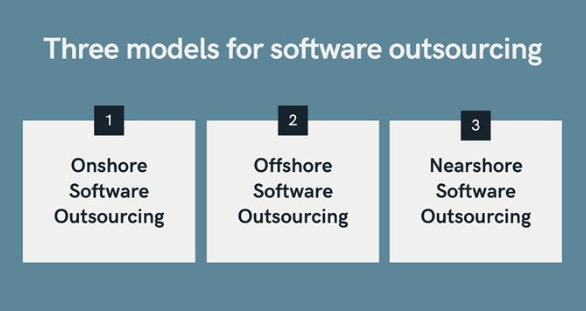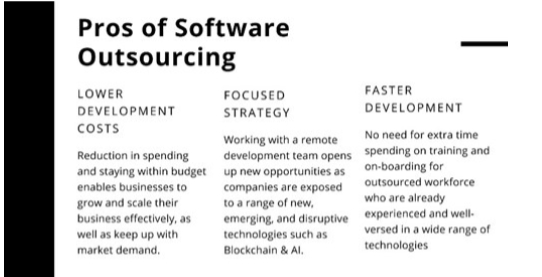In its simplest sense, Software Development Outsourcing describes an arrangement, in which an organization chooses to hire an external software development agency to effectively carry out all the tasks of a software development project, that could be done in-house instead. Software outsourcing is about the practice of a company handing over the control of a certain business process or project to a third-party vendor that is qualified and capable of handling the required business tasks.
The service of software outsourcing is increasingly becoming more and more popular with businesses choosing to outsource their development projects due to its many benefits, including effective development cost, and quick access to a large pool of IT tech talents. Software outsourcing is highly promising for business organizations that are looking to gain a competitive advantage by working with tech talents across the globe.

Onshore Software Outsourcing
Onshore outsourcing refers to the act of customer companies working with development teams of software companies that are located in the same country. The advantage of onshore outsourcing is that there are virtually no language barriers which makes communication much easier and eventually, making outsourcing more effective. However, in return, customers may have to pay more for development costs.
Offshore Software Outsourcing
Offshore outsourcing means working with development teams in other countries. This is the most cost-effective option due to low labour costs, and also online communications channels (e.g. Emails, VoIP Phones, Zoom video conferences, etc.) making it possible to effectively manage software projects remotely.
Nearshore Software Outsourcing
Nearshore outsourcing companies work with customers in neighbouring countries.

Software Outsourcing Advantages:
Lower development costs and reduce overhead spending
The most common reason leading businesses to outsource their development project is the drastic saving on development costs. Reduction in spending and staying within budget enables businesses to grow and scale their business effectively, as well as keep up with market demand. Thus, cost-saving remains the primary advantage for businesses to outsource their software development needs.
Besides, by contracting work to a third party, companies can cut down on their labour costs, including a variety of employee benefits such as insurance, training, leaves, and more - while paying outsourced teams at a competitive rate.
Outsourcing vendors usually determine the development cost based on the hourly rate of developers, in accordance with their seniority level, without taking into account the aforementioned expenses above - ultimately making the entire outsourcing endeavour more attractive for business organizations.
Flexibility
Customer companies can engage with software outsourcing vendors only when and if needed. Unlike permanent employment, there’s no legal bound or obligation of maintaining a long-term contract which offers customers the flexibility of having to pay for outsourcing during the project works. This is especially advantageous in comparison with hiring full-time in-house developers all year round, where their expertise may not be needed as much, after project completion.
In addition, cloud computing technology makes it easier than ever for people to work from home or anytime anywhere, making remote working gradually becomes the norm. Offshore remote working is more and more about human and machine interaction rather than micro human management. The location of remote developers is becoming a non-relevant factor in this day and age. Hiring remote IT tech talents to work on software projects is more attractive than ever.
Improve Business with a Focused Strategy
Working with a remote development team opens up new opportunities as companies are exposed to a range of new, emerging, and disruptive technologies such as Blockchain, Artificial Intelligence, and more which helps transfer the knowledge base and best-practice to internal teams effectively.
Having quick access to a large pool of IT talents on a large scale allows clients to implement their projects efficiently while having more time to focus on their core competencies. In particular, if customer companies are not in the IT industry, this offers significant benefits as it allows companies’ employees to have more time spent on other important tasks generating revenue such as sales and marketing, enhancing business growth and productivity.
Faster development and Speed up product time-to-market
Since the outsourced workforce is already experienced and well-versed in the technologies and tools required of the development process, there’s no need for extra time spending on training and on-boarding, saving customers a significant chunk of time to speed up the development process. Specifically, this is highly beneficial in the context of large international corporations, where the decision- making and approvals process might take much longer than usual.
Furthermore, changes that occurred will also be addressed quickly to ensure projects can move forward according to schedule. The remote development team is motivated to work quickly and deliver projects on time, providing customers a competitive edge over their competitors.